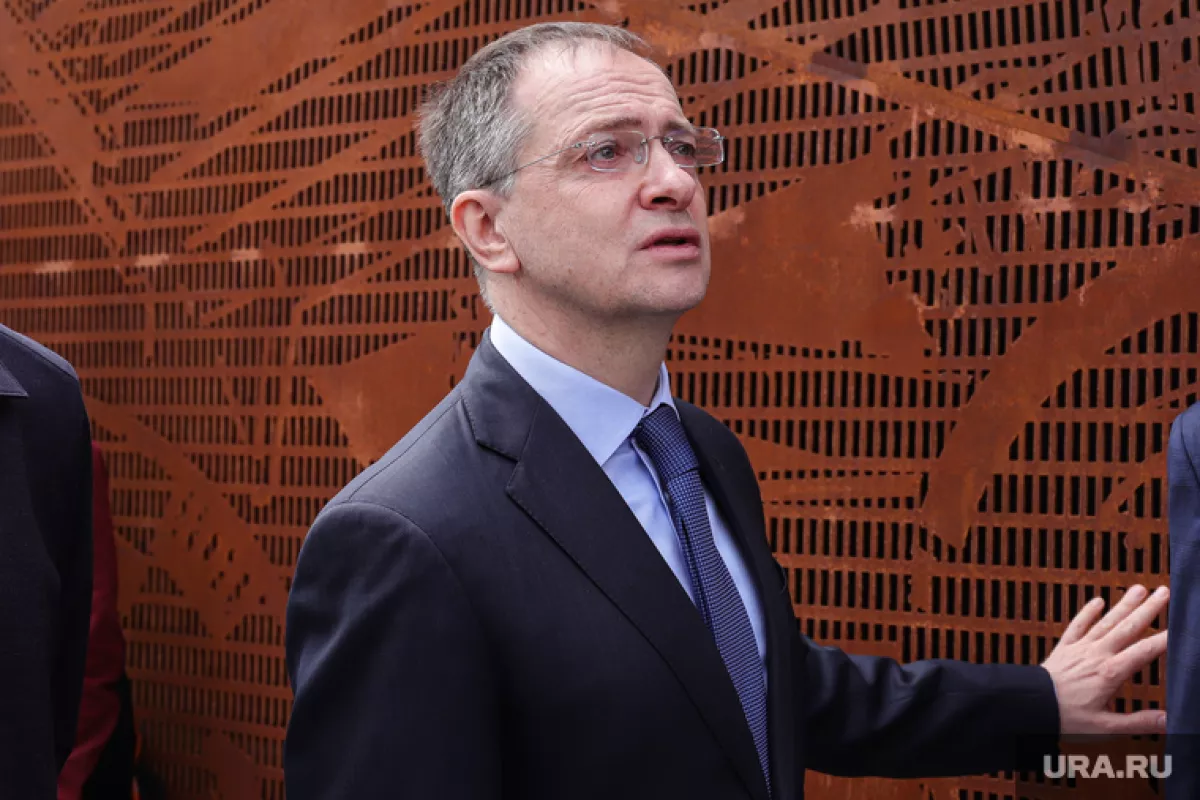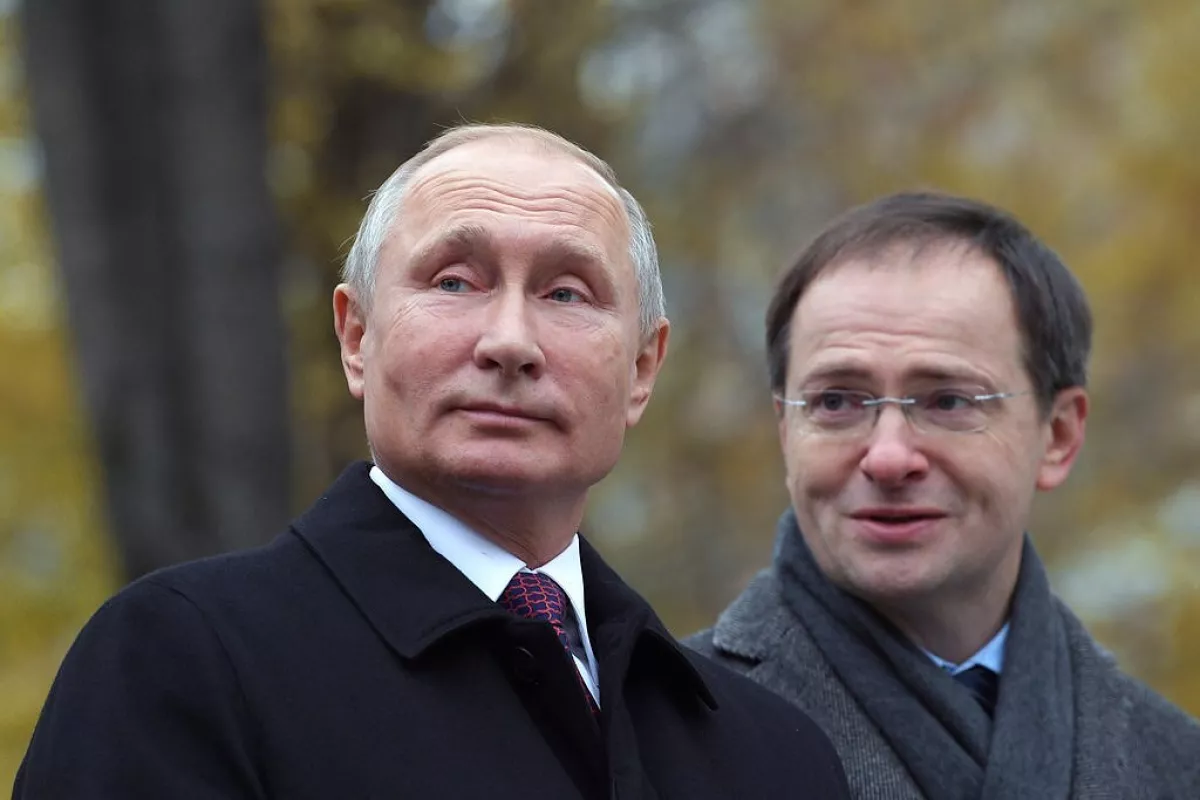Absurdity as a method Medinsky pushes his “version of history”
“If the conflict is halted along the front line without reaching a genuine peace agreement — just some sort of truce — then what we’ll get is, you know, like that disputed region between Armenia and Azerbaijan, Karabakh — this region will turn into a giant Karabakh,” said Vladimir Medinsky, head of the Russian delegation at the Istanbul negotiations and aide to the Russian president, in an interview with Russia Today. “Eventually, Ukraine, along with NATO and its allies, will join NATO, try to take it back, and that will be the end of the planet — that will be nuclear war.”
“We don’t want to create a pretext — a gigantic Karabakh, unrecognised by anyone, over which nuclear war could break out. That’s why we want to put an end to it, conclude a full-fledged peace, and recognise the new territories,” Medinsky added.
If we summarise the essence of this statement, it boils down to the following: if a country possesses nuclear weapons and, moreover, is a global power, then it is free to redraw the borders of other states, and any attempts to resist it may lead to the use of nuclear weapons by that country, with all the ensuing consequences. It is worth noting a certain honesty in this geopolitical assertion. The annexation of Ukrainian territories is not justified by moral considerations but is presented as a factor in the global power game. There remains an understanding that Ukraine has the right to "win back" its territories. In other words, the annexation is not being justified within the framework of legal norms, but rather there is an attempt to change those norms. The position of a global power is beyond ethical judgment — this is another message conveyed.

But this, so to speak, is the broader context and not the subject of analysis in the current piece. What is important for us in the statement made by the Russian official is that, to illustrate his thesis, Medinsky chose to use the Karabakh precedent as a narrower context. At the heart of this context lies the claim that Karabakh was allegedly a disputed region between Armenia and Azerbaijan.
Medinsky’s statement was immediately met with a response from Azerbaijan’s Foreign Ministry: “We would like to remind that Karabakh is an ancient and integral part of Azerbaijan. Russia itself has recognized and continues to recognize Karabakh as part of Azerbaijan’s territory.”
Certainly, it is no secret that Moscow, by applying the principle of conflict management, effectively helped Armenia to occupy Karabakh in the 1990s and to maintain this land under occupation for more than twenty years. However, at the official level, the Kremlin sought to adhere to professional diplomatic ethics and never questioned Azerbaijan’s territorial integrity. Despite the scale of Russia’s support for Armenia, including during the 44-day war, Russian President Vladimir Putin consistently responded to Yerevan’s calls to intervene and fight against Azerbaijan by saying, “The war is not taking place on Armenian territory.”
Mutual respect for each other’s territorial integrity ultimately resulted in the signing of the Declaration on Allied Interaction between Azerbaijan and Russia on February 22, 2022. Thus, Medinsky’s statement is unprofessional not only in terms of historical knowledge but also because it contradicts the spirit of Russian-Azerbaijani relations.

By the way, a few words about historical knowledge. Vladimir Medinsky has managed to make quite a few blunders in this field. At one time, Russian and foreign platforms were flooded with evidence of the controversial theses contained in Medinsky’s academic works. Let me share just one example.
“‘The criterion for positive or negative evaluation,’ — according to our contemporary, the well-known Russian scholar and thinker Platonov — ‘can only be Russia’s national interests. The first question that historical science must honestly answer is how much a particular event or individual act serves the interests of the country and the people. Weighing on the scales of Russia’s national interests creates the absolute standard of truthfulness and reliability of historical work,’” Medinsky writes on the very first pages of his doctoral dissertation in history, thereby reflecting his overarching position on the study and teaching of this discipline.
One could, of course, applaud Medinsky’s unclouded sincerity in his view of historical science—if it weren’t for the glaring logical flaw in his reasoning. If he had spoken at least about the “value” of historical work, the thesis might have been difficult but somewhat understandable. However, he talks about “truthfulness and reliability,” and these are not relative concepts. According to Medinsky, if a certain historical event does not fit Russia’s interests, then it is neither true nor reliable. That is absurd.
It seems that Medinsky is applying his absurd method in his argumentation regarding the Ukrainian crisis as well. The danger here is that, for an uninformed audience, this absurdity goes unnoticed and may be taken at face value.
Natural questions arise. Why promote the interests of one’s own state at the expense of ours? Why call into question the fairness of the Karabakh settlement, as well as Azerbaijan’s territorial integrity and sovereignty? Was this an uncareful rhetorical slip or a malicious intent aimed at aggravating the already complicated relations between Baku and Moscow in recent months?
Whatever the answers to these questions may be, one thing is clear: Vladimir Medinsky is overdue for some professional development courses.
P.S. As the material was being prepared for publication, the Russian Ministry of Foreign Affairs (MFA) responded to comments made by Vladimir Medinsky regarding Karabakh. Maria Zakharova, the spokesperson of the Russian MFA, stated that Russia officially recognises the Karabakh region as Azerbaijani territory. She clarified that Medinsky's remarks, however, pertained to "the historical aspect, socio-cultural peculiarities, and the pain of the people." While it's odd to hear the historical aspect presented as a matter for dispute, it's notable that Moscow at least attempted to correct Medinsky’s statement.








